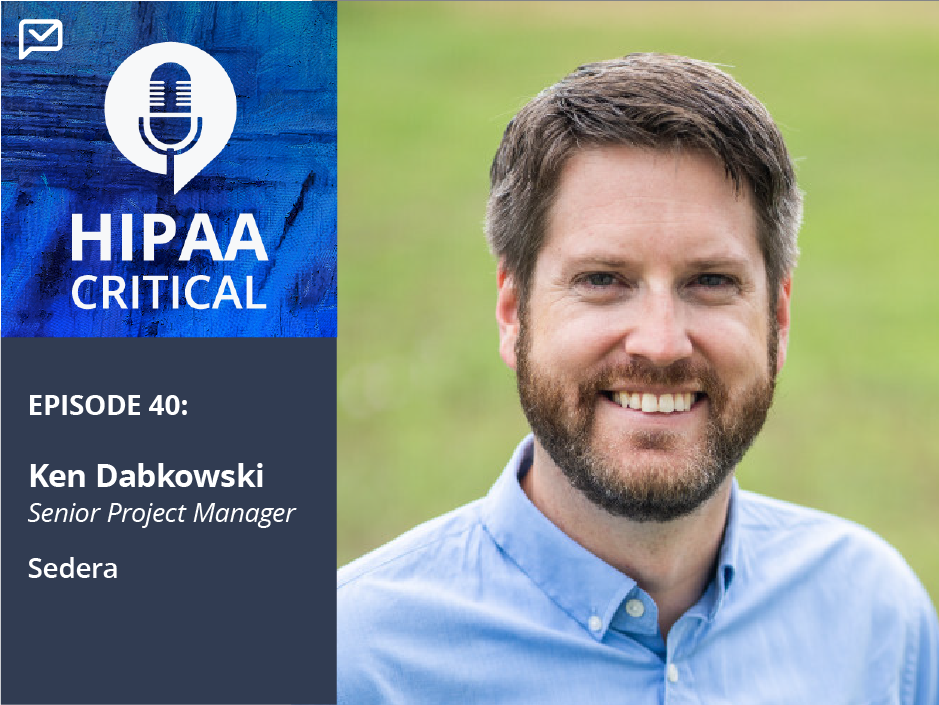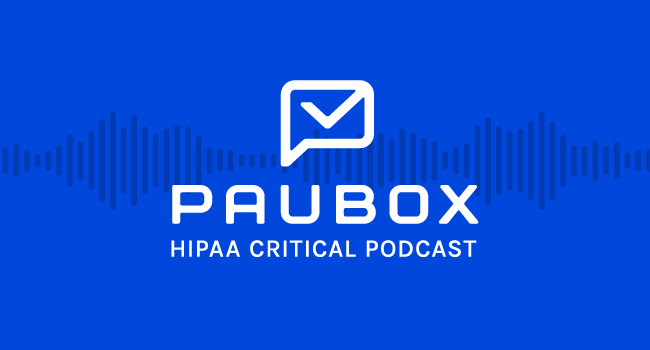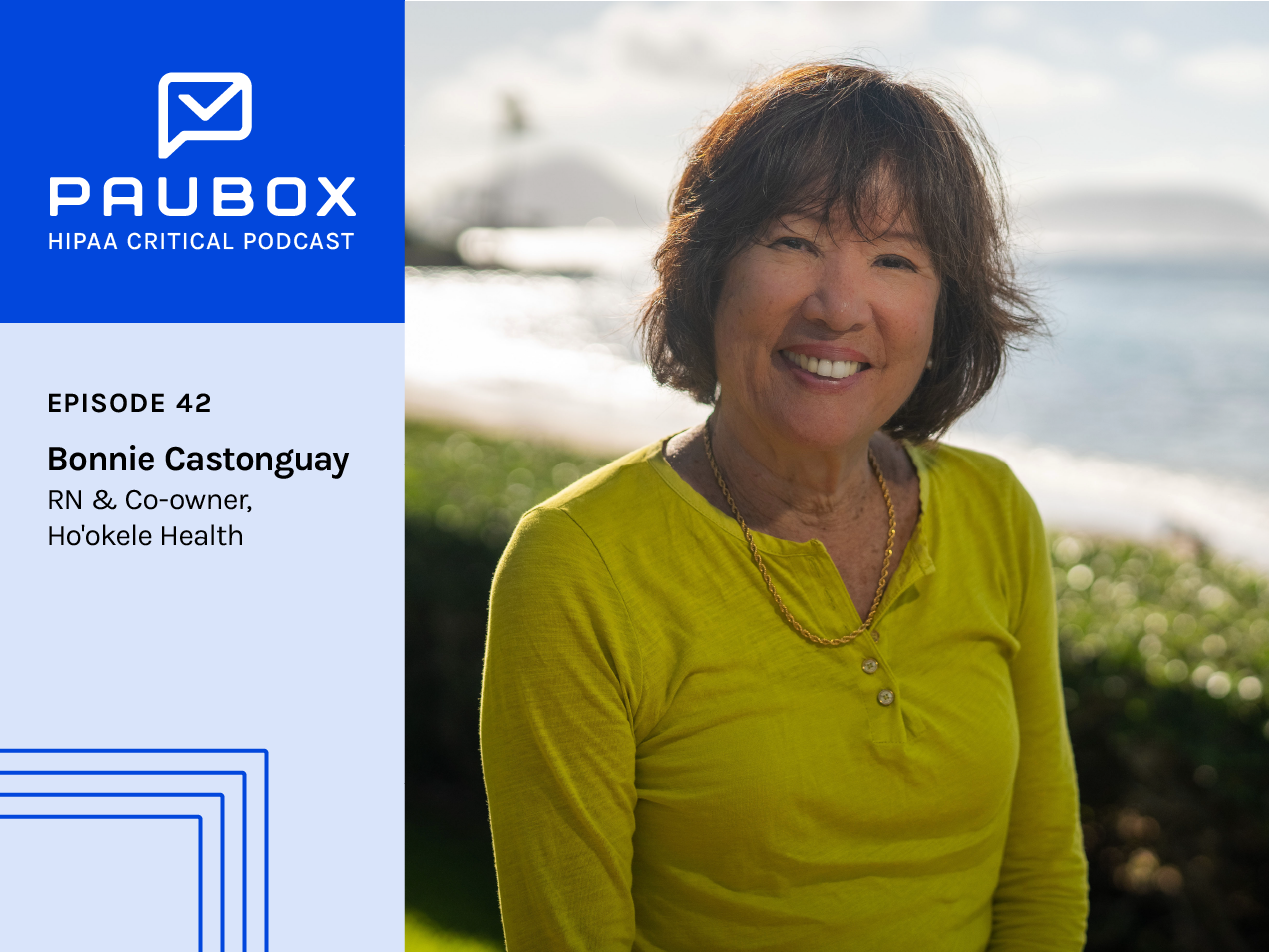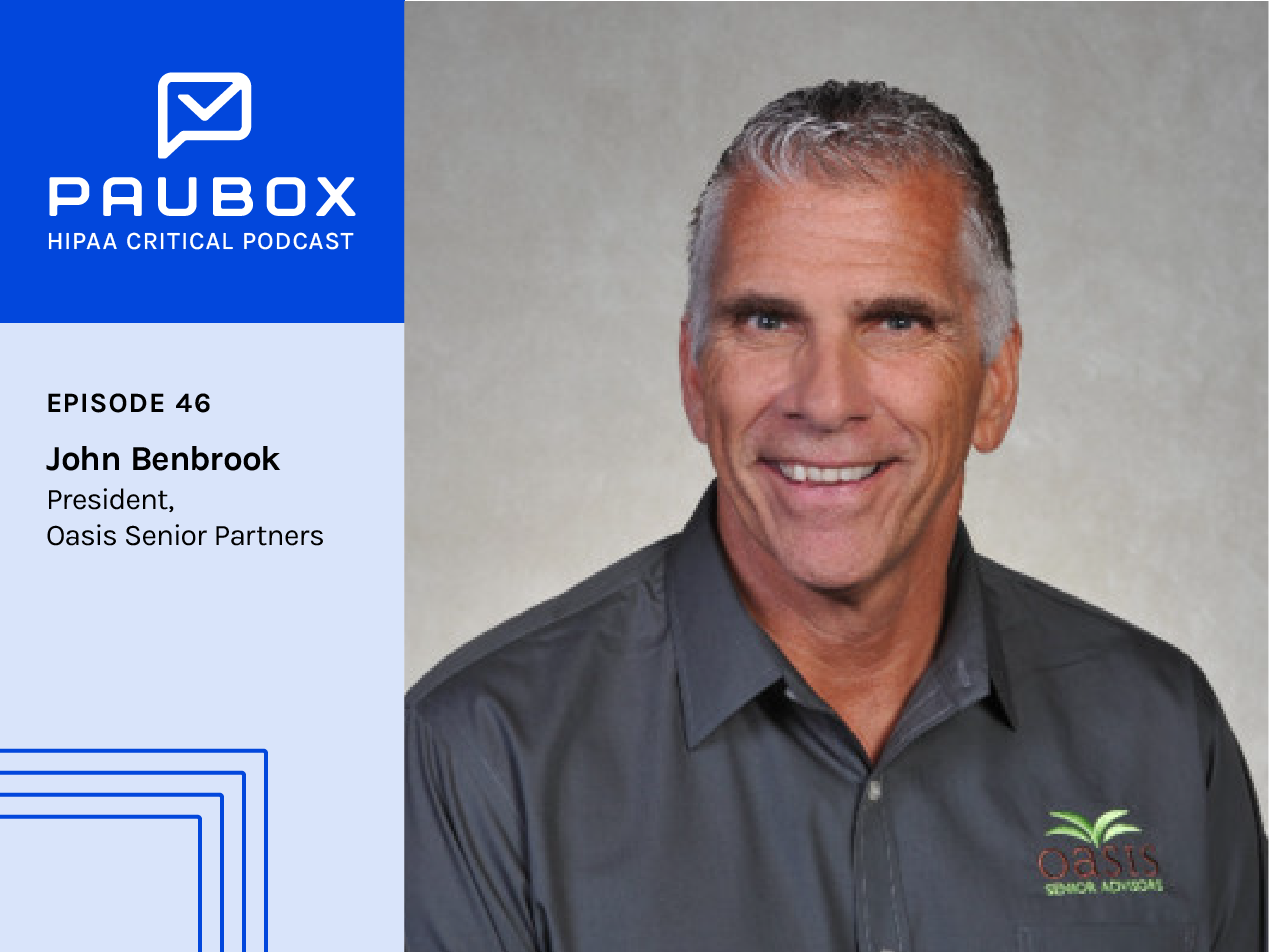7 min read
40. Ken Dabkowski: "As a tech-centered company, we want to make sure we're meeting the highest standards possible."
Hannah Trum Apr 28, 2021 12:00:00 AM

Rather read?
Hannah Trum: Hi, I'm Hannah Trum, and this is the HIPAA Critical Podcast. Today, Sierra Langston sits down with Ken Dabkowski, Senior Project Manager of Sedera , to discuss medical cost-sharing and Sedera's IT and cybersecurity stack.
Sierra Langston: Ken, can you tell us about your company, what industry you're in, what you guys do, and whom you serve?
Ken Dabkowski: Sure. Hello, my name is Ken, and I work for Sedera. We're a medical cost-sharing company based in Austin, Texas. Our members are based across the United States, and our team is based globally (mainly in Austin).
I can tell you a bit about the medical cost-sharing industry since it's new to some people. Although, it is a very old industry. So I can talk about the historical progression of it.
Medical cost-sharing really comes from many historical corollaries like mutual aid societies and giving circles in the sixteen and seventeen hundreds out of guilds, in Europe, and across the world. It made its appearance in the U.S. in the 1700s. It went through quite a bit of innovation in the 80s and 90s, primarily for faith-based communities.
Sedera was born about six years ago by Tony Dale, we'll talk a little more about that later, but he had a lot of experience in the medical cost-sharing space. We took the next logical step, which was to outfit this industry for the modern sharing economy.
Essentially to use a values-based approach rather than a faith-based approach or a small-group approach. So 30,000 members span the U.S. and essentially join the community based on a set of values that we can talk a little bit more about later.
Sierra: Okay, great. You mentioned this a little bit, but about what year were you founded?
Can you tell us a little bit more about why you were established and then how many locations you guys had?
Ken: We were founded in 2014 by Dr. Tony Dale. Tony, who was a doctor, came across the pond from England. There, he went to the United States and had worked quite a bit with medical cost-sharing communities before launching Sedera. He became intimately familiar with the advantages of a non-insurance approach and addressing the cost of health care.
About that time, he saw that there needed to be an alternative, a different way of being in terms of a non-insurance-based approach to get your medical needs taken care of. Time and time again, people were frustrated with the lack of affordability, transparency and pricing, accessibility, and medical care options.
So, in 2014, Tony launched Sedera and created this unique sharing organization with a vision to make high-quality human and transparent solutions the new normal in healthcare.
With everybody distributed, we have different team members across the United States but essentially based out of Austin. We have various affiliates and team members working all over this time.
Sierra: Okay, well, great. Thanks so much for sharing all of that great info. Can you provide a little bit of background on yourself and then your focus on Sedera?
Ken: Sure, well, a little background on myself. I've worked in many different industries, starting in the think tank world. I was in defense for a little bit, moved into finance before this, and got into project management. So I got more interested in the tech side of things.
When I moved here to Sedera, it was primarily because of a lot of historical reasons. In terms of the industry, I mentioned the work in finance that I had done focused on intellectual property space. In the trust and build world, I was trying to figure out how to make some of those financial models work in the modern economy. This is a very explicit kind of manifestation. I like the values-based approach at Sedera. I love the executive team all the way down. I mean, everybody upstairs has an excellent culture.
I didn't really get in to talk too much on the values, but I think we've all had experiences in the healthcare world where we'd like to be more aware, we'd like to see more transparency in pricing and be better consumers of healthcare. We don't even necessarily all think about consuming healthcare in the same way. I certainly didn't before joining Sedera.
It's fascinating to explore some free-market healthcare approaches and models where we can talk a little bit more directly with cash-paying patients, also known as DPC, virtual medicine, which I think many folks across the country have utilized in the last year.
As you can see where all this is going, we want to make sure that pricing is transparent and we're stepping away from the status quo, but as you can also see, the intersection of finance, healthcare, data, and communications back and forth.
You know, it's ripe for needing to make sure that everything's done above board, with security in mind. So, that's kind of where we sit today.
Sierra: Okay, and I know you mentioned medical cost-sharing. Can you explain a little bit more about options for healthcare and why this is needed?
Ken: Well, I think most, and it's generalizing, but across the U.S., most people are probably only used to getting their healthcare and consuming healthcare through the insurance model, right? No matter where you get that, whether it's your employer, through the national health care exchanges, or potentially as an uninsured person, those are the three ways most people consume health care. There hasn't been much thought given how you can fix the front end and the back end.
On the one hand, to be a better consumer, you need to hunt out the best pricing and the best quality. You want to have access to the doctors, and you want to know clearly what they're charging for anything from a knee replacement to bypass surgery.
There is some regulatory work supporting, you know, price transparency and whatnot in the last year, but really, what if you go to most medical providers. You'll have a hard time figuring out what their costs of services are and how to pay for those costs, especially if they don't have a direct relationship with a network or insurer.
That's where fixing the back end comes in: how can a community of folks contribute towards each other's needs, medical needs, support, and reduce overhead and waste in the system in the process.
If you can work on the transparency on the front end and create a financial backstop amongst a large enough group of folks on the back end, you can solve the two key worries while expanding access in the process.
Sierra: Okay. Do you mind providing our listeners with more info on Sedera's community banking tools? How do you guys share patient information safely and securely?
Ken: Sure. So right now, the Sedera communities consist of about 30,000 members. One of the most significant innovations we've modernized in the last year is our banking process. How it works is when you sign up to be a Sedera member.
Every person is creating what we call a medical cost-sharing bank account at our partner bank. This is an FDIC-insured bank in the U.S. In that account, you're making contributions, which essentially are a monthly contribution that is available to be shared with everybody in the community.
Once you make that contribution, it sits in that restricted savings account. It looks a bit different than all the other cost-sharing ministries or groups out there right now. This money is not pooled but is counted in aggregate. So the money stays yours, so to speak, in this individual bank account. Then when people submit their costs and bills for different health needs, they are qualified under all of our principles and whatnot.
The community then funds those by transmitting those directly between members to a member. Each member is sharing money out of their bank account now to the member, and it all takes place within an FDIC insured banking institution. It's got a new FinTech front end where they can set that up pretty quickly and efficiently as part of the streamlined process. So, that's what we spent a lot of the last year doing.
As part of all that, you can imagine that the next wave of innovation we're putting together ensures everybody's data is secure. There, any health data is safe, none of that gets transmitted between parties, but we want to create a community feel. We're playing with different ways to make each share amongst all the various bank accounts a little more personable.
So you've probably seen this more in crowdfunding and whatnot. It may be something like a first letter or first name, last initial or last name, and sharing X dollars with you towards your medical needs. We want to share the information to know your actual contribution is helping a real human on the other side of the transaction.
Both Sedera and the bank, at that point, are really out of the equation. It's a member-to-member sharing community with both transparencies of what's happening in terms of data flow and money and data security, so that, you know, everything from identity to bank information to healthcare information stays, you know, locked in the system there.
Sierra: Okay. Can you tell us what led you guys to seek a secure email solution? What problem or issue were you guys experiencing?
Ken: Sure, well, Sedera is really in at least two regulated industries. We deal with quite a bit of healthcare information, so we have to comply with HIPAA regulations. We have many state privacy laws that we take into account and take very seriously, and we also work with a regulated partner in the bank.
We have a lot of PII that gets transmitted along with bank data that gets shared. Therefore, we have to ensure all of that is secure on both sides, not just for regulatory purposes, but in case any breach would break trust with our member base.
So as a tech-centered company, we want to make sure we're meeting the highest standards possible, even without the regulation, because we send thousands of emails every day.
We're operating in the healthcare space and want to find a tech-forward and kind of the latest and greatest solution. We also want it to be painless to implement because many other secure email systems require more complex, time-intensive input by the members of the customers.
Whether it's entering a password or logging into a different system to see secure messages, we want to forgo all of that and encrypt them to end on the front end and create a better user experience on the back end.
Hannah: Thank you for letting us listen to that wonderful conversation Sierra and Ken. Paubox is currently hosting monthly zoom social mixers for our customers and non-customers. Each mixer is about one hour. Every attendee will receive an adult beverage of their choice delivered to their door the day of. These mixers are entirely free. Please send an email to hannah@paubox.com if you'd like to attend. Put on your calendar our next free webinar , "The Cyber Threat Landscape Evolution," featuring speaker Tony UcedaVélez and one of our very own, Travis Taylor. This webinar is completely free as well. It will take place on June 2 at 10 am Pacific Time and is moderated by Paddy Padmanabhan, CEO of Damo Consulting, Inc. As always, you can listen to every episode of the HIPAA Critical Podcast on Paubox.com or subscribe via Apple Podcasts, Spotify, IHeartRadio, Stitcher, or Amazon Music. Thanks for tuning in to another episode of the HIPAA Critical Podcast. I'm your host, Hannah Trum, signing out.Subscribe to Paubox Weekly
Every Friday we'll bring you the most important news from Paubox. Our aim is to make you smarter, faster.




